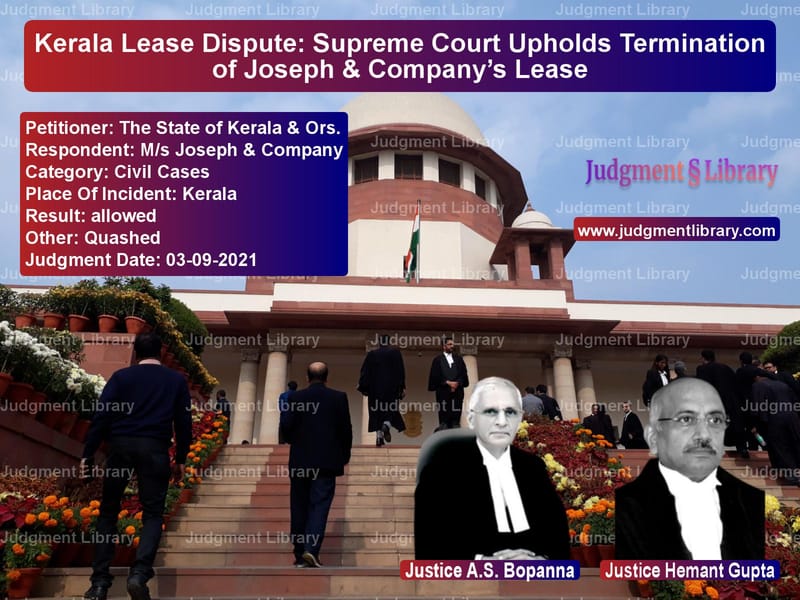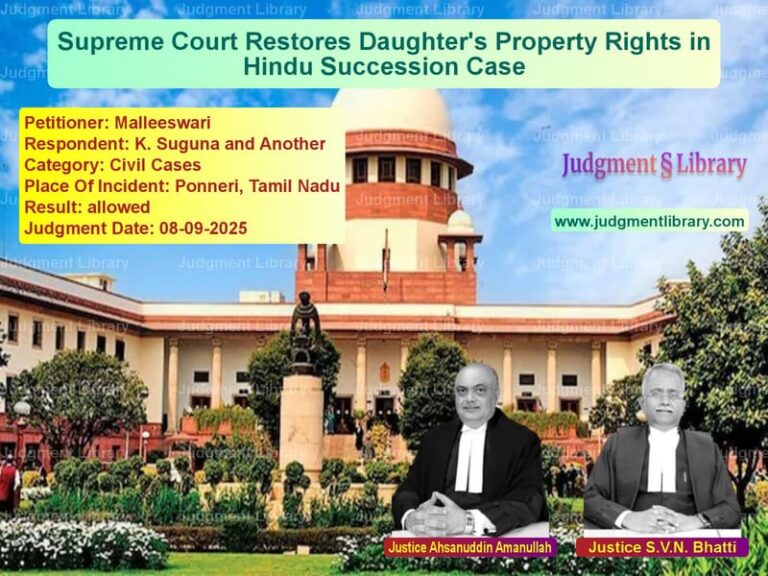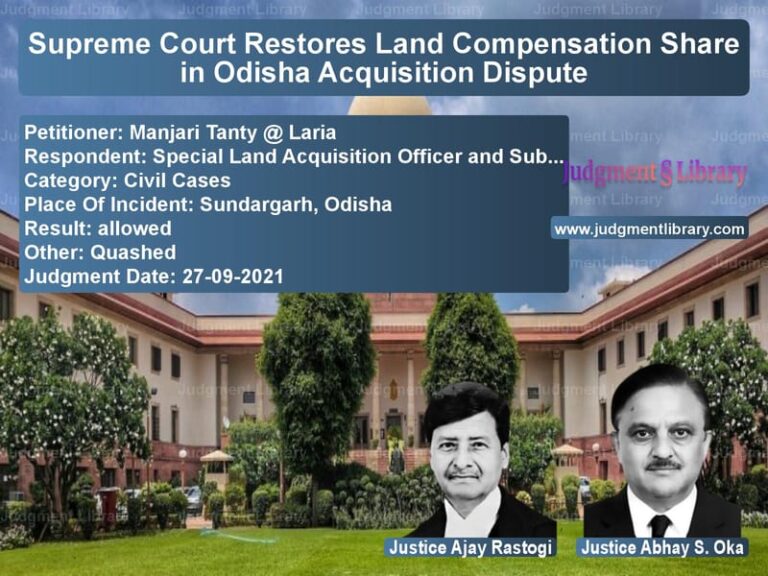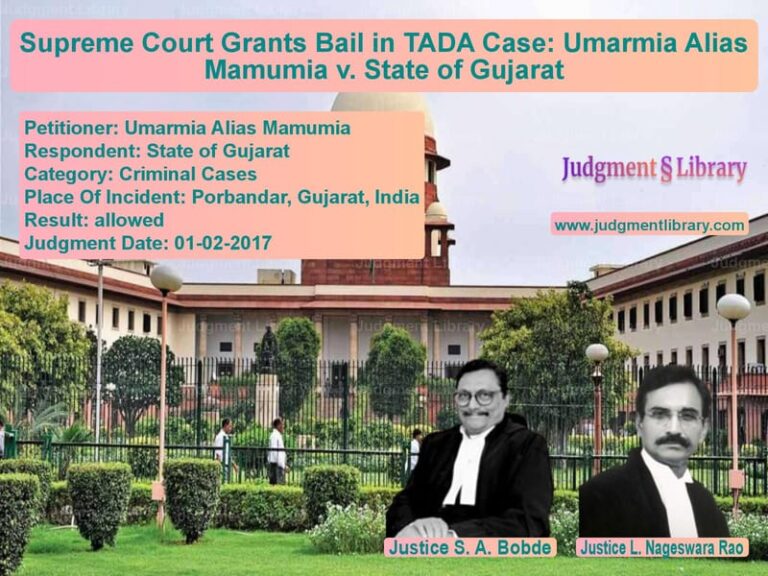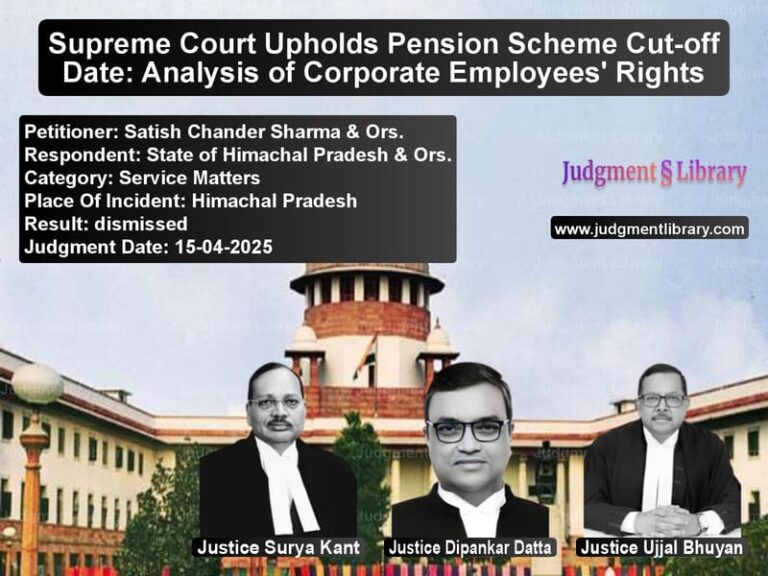Kerala Lease Dispute: Supreme Court Upholds Termination of Joseph & Company’s Lease
The Supreme Court of India recently ruled in the case of The State of Kerala & Ors. vs. M/s Joseph & Company, involving a dispute over a government lease in Kerala. The case centered around the legality of the lease termination of Joseph & Company for allegedly transferring a portion of leased land without prior government approval. The Supreme Court upheld the termination, reversing the Kerala High Court’s ruling.
Background of the Case
The dispute traces back to 1953 when the erstwhile Travancore-Cochin government auctioned abandoned portions of the Beatrice Estate. Mr. P.I. Joseph successfully bid for 246.26 acres of land and took possession in 1955. However, no formal lease agreement was executed at that time.
Later, in 1974, Mr. P.I. Joseph transferred the land to K.K. Joseph. The Kerala government then executed a lease deed in 1979 in favor of K.K. Joseph, who claimed to be representing a partnership firm, M/s Joseph & Company. Subsequently:
- In 1983, K.K. Joseph transferred 50 acres of the leased land to Mr. Raghavan through a registered sale deed.
- K.K. Joseph retired from the firm, and Ms. Meera Scaria became the Managing Partner.
- The government issued a notice in 1992, stating its intention to terminate the lease.
- After various legal challenges, the Supreme Court in 2004 allowed the Kerala government to issue a fresh show-cause notice.
In 2004, the government formally terminated the lease, citing two breaches:
- K.K. Joseph transferred leasehold rights to M/s Joseph & Company without prior government approval.
- He sold 50 acres of leased land to Mr. Raghavan without the lessor’s consent.
Arguments by the Petitioner (State of Kerala)
- The government argued that Clause 14 of the lease deed prohibited the lessee from transferring land without prior permission.
- The 1983 sale of 50 acres to Mr. Raghavan violated the lease terms, warranting termination.
- Joseph & Company was treated as the lessee only due to procedural oversight, but the lease was originally in K.K. Joseph’s name.
- Even if rent was accepted for the leased land, it did not waive the government’s right to terminate under Clause 14.
Arguments by the Respondents (Joseph & Company)
- They argued that the government had consistently treated M/s Joseph & Company as the legitimate lessee.
- The transfer to the firm was not a breach as it was effectively the same entity.
- The sale of 50 acres could have been remedied under Clause 12 of the lease, which allows lessees to rectify defaults before termination.
- They contended that since the government continued to accept rent, it waived its right to terminate.
Supreme Court’s Key Observations
The Supreme Court analyzed whether the breaches warranted termination:
- The lease clearly stated that prior government approval was mandatory for any transfer. The unauthorized transfer to Joseph & Company constituted a violation.
- The 1983 sale to Mr. Raghavan was an outright transfer of government land, making it a serious and irreversible breach.
- Clause 12 allowed lessees to rectify defaults, but it did not apply to breaches under Clause 14, such as unauthorized land sales.
- Merely accepting rent did not mean the government waived its right to enforce lease conditions.
Final Verdict
Based on these findings, the Supreme Court:
- Allowed the appeal filed by the State of Kerala.
- Reinstated the government’s decision to terminate the lease.
- Set aside the Kerala High Court’s ruling, which had favored Joseph & Company.
Implications of the Judgment
This ruling has far-reaching consequences for land leases and government contracts:
- Strict enforcement of lease conditions: Government lessees must comply with transfer restrictions, or face termination.
- Prevention of unauthorized sales: The judgment prevents the misuse of government land under long-term leases.
- Limited waiver doctrine: Government acceptance of rent does not automatically waive its right to enforce lease conditions.
- Clarification on rectification rights: Clause 12’s rectification provision applies only to correctable defaults, not outright violations like land sales.
Conclusion
The Supreme Court’s ruling in The State of Kerala & Ors. vs. M/s Joseph & Company sets a crucial precedent in government lease disputes. It underscores the importance of adhering to lease terms and clarifies that violations, especially unauthorized sales, can lead to outright termination. The decision reinforces the principle that government land leases must be strictly regulated to prevent misuse and uphold public interest.
Petitioner Name: The State of Kerala & Ors..Respondent Name: M/s Joseph & Company.Judgment By: Justice A.S. Bopanna, Justice Hemant Gupta.Place Of Incident: Kerala.Judgment Date: 03-09-2021.
Don’t miss out on the full details! Download the complete judgment in PDF format below and gain valuable insights instantly!
Download Judgment: the-state-of-kerala-vs-ms-joseph-&-company-supreme-court-of-india-judgment-dated-03-09-2021.pdf
Directly Download Judgment: Directly download this Judgment
See all petitions in Property Disputes
See all petitions in Lease Agreements
See all petitions in Judgment by A. S. Bopanna
See all petitions in Judgment by Hemant Gupta
See all petitions in allowed
See all petitions in Quashed
See all petitions in supreme court of India judgments September 2021
See all petitions in 2021 judgments
See all posts in Civil Cases Category
See all allowed petitions in Civil Cases Category
See all Dismissed petitions in Civil Cases Category
See all partially allowed petitions in Civil Cases Category

